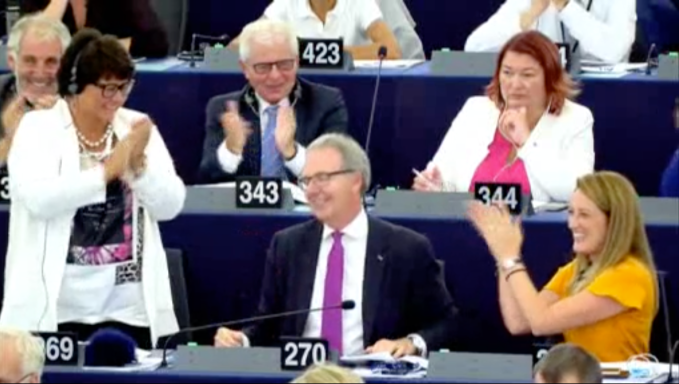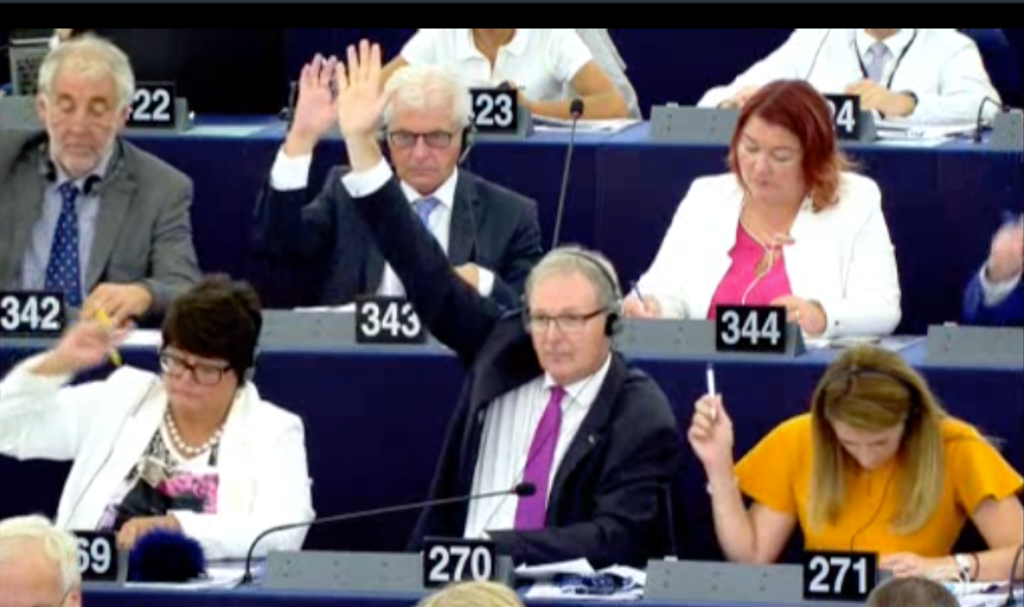The European Parliament has just voted to back controversial proposals to reform online copyright — including supporting an extension to cover snippets of publishers content (Article 11), and to make platforms that hold significant amounts of content liable for copyright violations by their users (Article 13).
Plenary adopts it’s negotiating position on copyright rules for the digital single market. Negotiations with Council will begin soon. pic.twitter.com/hJOhClrZyf
— JURI Committee Press (@EP_Legal) September 12, 2018
Today’s plenary vote in the European parliament was on amended proposals that had been rejected by MEPs in a vote in July with parliamentarians arguing for a fuller debate and more balanced measures.
The vote is a major victory for MEP Axel Voss who has been driving the copyright reform.
MEPs largely backed Voss’ amended proposals today which had narrowed the scope of the rejected text, such as, in the case of Article 11, by allowing for links to contain individual words from the linked to publishers’ content — an attempt to respond to critics’ contention that the measure would outlaw hyperlinks (which can often contain the headline of an article).
On Article 13 Voss’ amended proposal had reduced the scope to platforms that both host “significant” amounts of content and also “promote” them. It also includes an exception for small businesses.
As the votes were announced a visibly delighted Voss beamed, clapped and hugged his seat neighbours, as well as giving a broad thumbs up to all those watching.

At the same time critics and free speech advocates were describing the result as a catastrophe…
Final vote for Parliament position on the copyright directive with #UploadFilters and #LinkTax: adopted. Parliament has failed to listen to citizens’ and experts’ concerns. #SaveYourInternet pic.twitter.com/gtGi6rg5kL
— Felix Reda (@Senficon) September 12, 2018
“Members of the house, a heartfelt thanks for the job that we have done together. This is a good sign for the creative industries in Europe,” said Voss after the vote, as he asked for the report to be sent back to committee to begin institutional negotiations with Member States, via the European Council.
MEPs duly obliged.
There was just one interruption — with a single MEP standing up to denounce the result as “an enormous strike against freedom of speech on the Internet”. Proceedings continued.
Other amendments that had been tabled by MEPs but rejected by the parliament as a whole included various middle ground positions but also ditching the reforms entirely and leaving the current law as is.
Expanding on her criticisms of the reform in a statement after the vote, Julia Reda, Pirate Party MEP and VP of the Greens/EFA group — who has been a trenchant critic of the copyright reforms — said the parliament had voted to make “nothing but cosmetic changes”, reiterating her warning that the proposal would result in platforms imposing upload filters that would catch “perfectly legal content like parodies and memes”, as well as imposing a pointless EU “link tax”.
“Today’s decision is a severe blow to the free and open internet,” she said. “By endorsing new legal and technical limits on what we can post and share online, the European Parliament is putting corporate profits over freedom of speech and abandoning long-standing principles that made the internet what it is today.”
“Five years after the ‘link tax’ came into force in Germany, no journalist or publisher has made an extra penny, startups in the news sector have had to shut down and courts have yet to clear up the legal uncertainty on exactly where to draw the line,” she added. “The same quagmire will now repeat at the EU level — no argument has been made why it wouldn’t, apart from wishful thinking.”
MEP Marietje Schaake also expressed disappointment, telling us: “The Parliament squandered the opportunity to get the copyright reform on the right track. This is a disastrous result for the protection of our fundamental rights, ordinary internet users and Europe’s future in the field of artificial intelligence. We have set a step backwards instead of creating a true copyright reform that is fit for the 21st century.”
“This is a terrible result for users, consumers, innovators and researchers,” added MEP Catherine Stihler. “This will do nothing for the European digital economy, it will stifle free speech and create barriers of entry to the market for European start-ups.”
Above the fray, the Commission welcomed the result of the vote.
In a joint statement, the European Commission’s VP for the Digital Single Market Andrus Ansip and commissioner for Digital Economy and Society, Mariya Gabriel, said:
We welcome today’s vote at the European Parliament. It is a strong and positive signal and an essential step to achieving our common objective of modernising the copyright rules in the European Union.
Discussions between the co-legislators can now start on a legislative proposal which is a key element of the Digital Single Market strategy and one of the priorities for the European Commission.
Our aim for this reform is to bring tangible benefits for EU citizens, researchers, educators, writers, artists, press and cultural heritage institutions and to open up the potential for more creativity and content by clarifying the rules and making them fit for the digital world. At the same time, we aim to safeguard free speech and ensure that online platforms – including 7,000 European online platforms – can develop new and innovative offers and business models.
The Commission stands ready to start working with the European Parliament and the Council of the EU, so that the directive can be approved as soon as possible, ideally by the end of 2018. We are fully committed to working with the co-legislators in order to achieve a balanced and positive outcome enabling a true modernisation of the copyright legislation that Europe needs.
Also exceptionally happy are a swathe of creative industries, with the music industry first in line — which has long been pointing out they’re the ones losing out as things stand online…
The European Publishers Council welcome the adoption of the Publisher’s neighbouring right.
“Today, we give credit to MEPs who voted for press freedom, democracy, professional journalism and European values. We thank the Rapporteur, Axel Voss, MEP, for working tirelessly to achieve a balanced outcome,” said its exec director, Angela Mills Wade, in a statement.
A coalition of European press publishers — representing the European Magazine Media Association, theEuropean Newspaper Publishers’ Association, the European Publishers Council and News Media Europe — added: “This reform is not just about the modernisation of copyright but about the fundamental function of our democracies. Today the European parliamentarians prove they value the European independent press by voting for a publishers’ right that will help ensure the sustainability of the European press sector”.
While the parliament has now agreed its negotiating position on the reform the process is not yet over.
There will be trilogue discussions with Member State representatives, via the European Council, and a final vote to pass the law — likely early next year.
Reda warned that without filters being “explicitly excluded in the negotiations” there will be increased public protest — suggseting also that the entire Directive “may well still be rejected when it comes up for a final vote right before next year’s European elections”.
Now that Parliament and Council have adopted their positions, we will have one final chance to reject #UploadFilters and #LinkTax in the final vote on the directive after trilogue, probably in the spring. Talk to your governments meanwhile! #SaveYourInternet
— Felix Reda (@Senficon) September 12, 2018
The Computer & Communications Industry Association, which is also not a supportor of the reforms, urged the Council and Parliament to “come to a balanced outcome in final negotiations”.
“We regret that a majority of Members of the European Parliament today ignored the warnings of the online sector, academics, innovative publishers, research institutions and civil rights groups on the real threats this proposal causes,” said its senior policy manager, Maud Sacquet, in a statement.
BEUC, the European Consumer Organisation, also denounced the result of the plenary vote, warning that if the plans MEPs backed today become EU law the “benefits of the Internet for consumers will be at risk”.
“It is beyond comprehension that time and again EU policy makers refuse to bring copyright law into the 21st century. Consumers nowadays express themselves by sampling, creating and mixing music, videos and pictures, then sharing their creations online. MEPs have decided to thwart this freedom of expression which is dangerous for creativity and innovation,” said Monique Goyens, director general of BEUC, in a statement.
“The consequence of this vote is clear. Platforms will have no other option than to scan and filter any content that consumers want to upload. Experience shows that this will lead to many uploads being unjustifiably blocked. This is not the type of internet consumers need or expect. This protectionist reform will only benefit the copyright industry at the expense of consumers.”































Comment